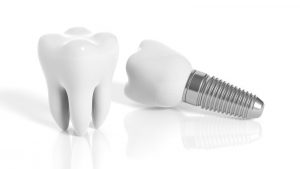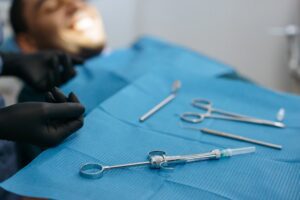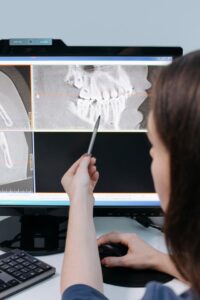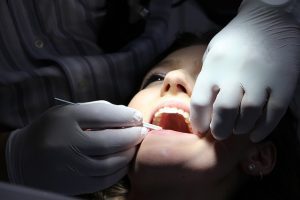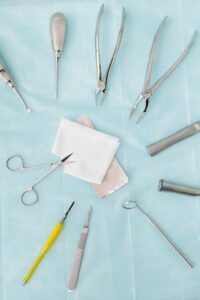- For any questions or concerns, please call our office at (937)382-8020.
Introduction
Alright, so you’ve received the news that a tooth extraction is on the agenda. Whether your tooth is damaged, decayed, causing overcrowding, or has an infection, knowing what to expect can significantly enhance your journey through the procedure, from pre-op to post-op.
What to Expect
When it comes time for a tooth extraction, we can use either local anesthesia or IV sedation. The selection between the two is contingent upon patient preference and the complexities of the procedure.
Once the tooth area is completely numb, Dr. Puckett proceeds with the extraction process. Typically, this procedure takes only a few moments. If the tooth is impacted, Dr. Puckett will cut away a small amount gum and bone, then rock the tooth to loosen it. Sometimes, if a tooth is difficult to dislodge, he will remove it in segments.
Once the tooth is extracted, Dr. Puckett will ask you to bite down on some gauze to help a blood clot form. Every now and then, a few dissolvable stitches might be necessary. Historically speaking, about 1% of cases end up with dry socket, but our office rarely sees this issue. We use a holistic care regimen after removing teeth which has nearly eliminated the risk of dry socket.
Pre-Op Instructions
In order to prepare for your surgery and to ensure your safety, please follow these instructions:
- Do not eat or drink anything for 6 hours before your surgery. For your safety, we need you to have an empty stomach.
Do not use any Cannabis products for at least 72 hours (three days) prior to surgery.
Continue all medications prescribed by your physician. Do not stop any medication unless directed by your physician.
Escorts must stay during surgery and to please have your adult escort take you directly home after the surgery.
Dress comfortably. Please wear shoes that tie or boots, no slip on shoes. Please wear a short-sleeved shirt. If cold, a sweatshirt is ok, but remember the short-sleeved shirt underneath.
Please do not wear necklaces, dangling earrings, or make-up on the day of surgery.
Please do not wear contact lenses, wear glasses on the day of surgery.
For moms of teenage boys – we do offer free haircuts – just let us know how short.
Post-Op Instructions
- Immediately after surgery: Resting for the first one to two days will help begin your healing. Heavy physical activity can result in increased pain and prolong the healing time. Once you get home, rest and relax. Elevating your head, placing cold packs on your face and eating soft foods are important post-operative instructions to remember. Refraining from smoking will help the extraction sites heal better and can decrease post-operative pain.
- Pain: Most patients require pain medication for one or two days after their surgery. Narcotic pain medications will make you groggy and slow your reflexes. Do not drive, operate machinery, or drink alcoholic beverages while taking these medications. Also, do not take these medications on an empty stomach, as this can increase nausea and vomiting.
- Bleeding: Some bleeding is to be expected following tooth removal. Minor bleeding or oozing for the first few days is not uncommon. Firm pressure on either a gauze pad or a moistened tea bag for thirty minutes will stop the bleeding in most cases. Keeping your head elevated will also help. If bleeding does not subside, please call us for additional instructions.
- Swelling: Ice, frozen peas, or a gel pack will be of great benefit to minimize post-operative swelling. This needs to be started as soon as possible after the surgery and continued for the first 24 hours in order to help the most. Swelling will peak on days 2-3 post-operatively, and then decrease each day. After 48 hours, moist heat will help to decrease swelling and bruising quicker.
- Diet: Eating soft foods for the first few days will make your recovery easier. Do not use a straw for the first two days – this can increase bleeding.
- Oral Hygiene: Be gentle with cleaning your mouth after surgery. Do not vigorously rinse your mouth for the first 24 hours. Gently brushing and rinsing are important. Rinsing should be done using lukewarm water with either a teaspoon of salt added or a small amount of Scope or Listerine added. If you are given a plastic irrigating syringe, do not begin irrigating until day 7 post-operatively. The salt water or Scope-water solution is used for irrigating.
- Medications: Do not stop any medication which has been prescribed by your physician, unless directed to do so by your physician.
Learn More
Reasons You Might Need a Tooth Extraction
The teeth that come in after you lose all your milk teeth – your adult teeth – are meant to last you through your decades
Aftercare is Important After a Tooth Extraction
There are many reasons you might need to have a tooth extracted. A tooth that’s cracked past the gum line, decayed or infected might need
7 Replacement Options for Missing Teeth
Missing a tooth or facing a tooth extraction? You’re not alone. In fact, the average adult aged 35 to 49 in the United States is
How Modern Oral Surgery Makes Tooth Extraction a Relatively Painless Procedure
As your oral surgeon, we want you to be able to keep your teeth for a lifetime. We care about you and your teeth, after
Reasons Why Someone Would Need a Tooth Extraction
Most of permanent teeth are good for life, but sometimes a tooth needs to be pulled. There are actually quite a few reasons an adult
Tooth Extraction: What to Expect
So you’ve been told you need a tooth extraction. Your tooth is damaged or decayed, your mouth is too crowded, or you have an infection.


